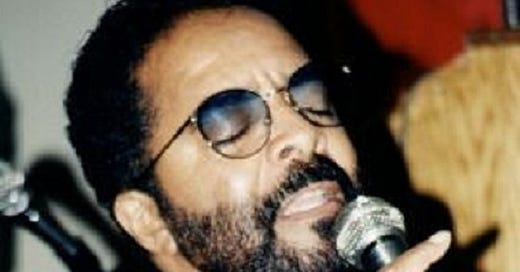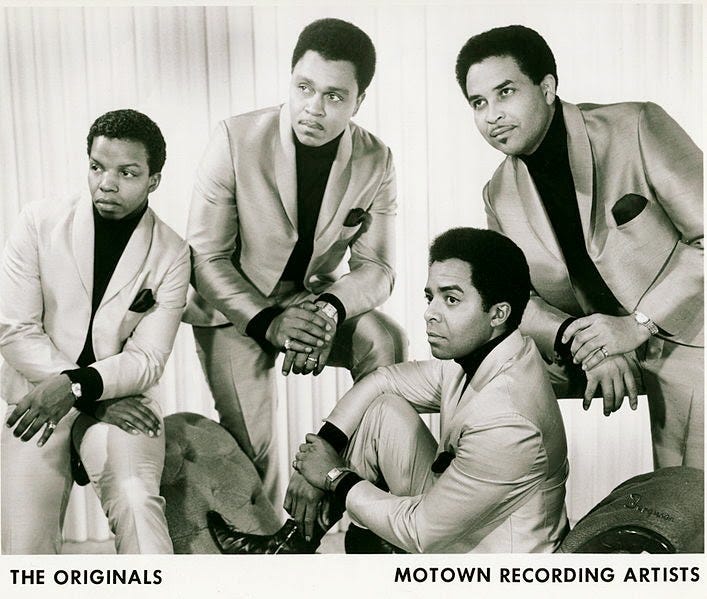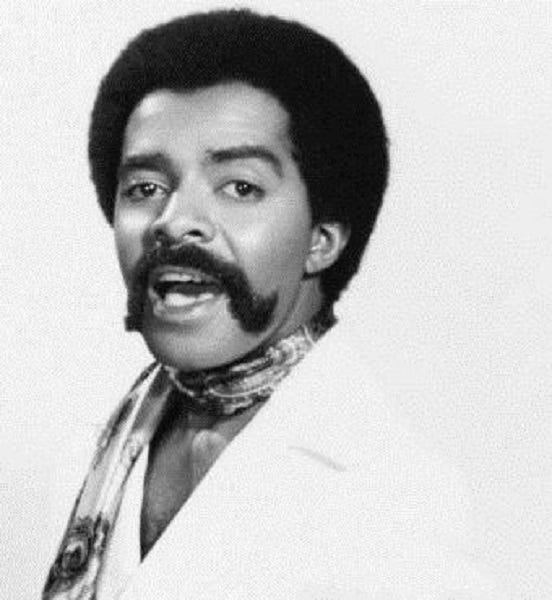Freddie Gorman (April 11, 1939 – June 13, 2006) – Don't Put Me On (1978)
The Originals founding member who co-wrote the #1 hit song "Please Mr. Postman" also co-wrote this disco funk bomb for the group's first post-Motown LP.
View most updated version of this post on Substack
Search our full archives
Freddie Gorman was a singer/songwriter, keyboardist, and producer who co-wrote Motown’s first #1 hit “Please Mr. Postman,” wrote songs with Brian Holland and Lamont Dozier before being replaced by Eddie Holland, and was one of the founding members and longtime bass singer of the Originals.
Born in Detroit, Frederick Cortez Gorman sang on street corners and joined his first vocal group the Qualitones in high school. In 1957, he formed another group called the Fideletones with his best friends Sonny Sanders and future Motown superstar producer Brian Holland.
Gorman worked as a mail carrier, and one of the customers on his route was Berry Gordy. When he realized Gordy was in the music business, he persuaded him to listen to his group, which is how Gordy first met Holland. Gordy produced two of their songs for the Aladdin label, “Pretty Girl” and “Game Of Love,” neither of which were released. The Fideletones also recorded the doo-wop ballad “Is It Too Late?” in 1958, which similarly remained unreleased until years later. They broke up the following year, and Gorman went back to delivering mail.
After Gordy’s label Tamla Records took off and was renamed Motown in 1960, he hired Holland as a staff writer and producer. Holland in turn enlisted Gorman to provide lyrics for what would become the debut single for the Supremes, the haunting “I Want A Guy” with Diana Ross on lead. Recorded in December, 1960 and co-written by Holland, Gorman, and Gordy, it was released in March, 1961 but failed to chart.
In April, 1961, when the label’s newly signed girl group the Marvelettes were preparing their debut single, Gordy teamed Holland with songwriter/producer Robert Bateman to re-work the song they had auditioned with. Especially since the song was titled “Please Mr. Postman,” Holland called Gorman again and asked him to write the lyrics.
The result was a girl group classic, recorded with Marvin Gaye on drums. Released as a single that August, the label mounted a huge promotional campaign behind it, led by newly hired national sales and promotion manager Barney Ales. The single stayed on the charts for 23 weeks, peaking at #1 on the Billboard Hot 100 in December, 1961. It was Motown’s first #1 record, and would later be famously covered by the Beatles and the Carpenters.
That fall, Gordy released Gorman’s debut single as a solo artist on Motown’s Miracle subsidiary. The upbeat jam “Just For You” was co-written by Gorman, Holland, Bateman, and Janie Bradford, and produced by Holland and Bateman, with “The Day Will Come” on the flip.
Gorman continued to write with Holland and Bateman, and then alongside Holland and Lamont Dozier who replaced Bateman in the production team. They wrote more songs for the Marvelettes and other Motown artists including Mary Wells, The Contours, and Smokey Robinson & the Miracles. In 1963, Gorman was replaced as the team’s lyricist by Brian’s brother Eddie Holland. He went back to the post office but continued writing songs.
The following year, he began working with Motown’s rivals, the Detroit-based Golden World label. He gave the blue-eyed soul group the Reflections a song he had just written with Bob Hamilton, “(Just Like) Romeo and Juliet.” As Gorman later recalled, he thought it would be a good fit for them “because it had a pop feel, as opposed to the R&B thing they were doing.” The group members were unconvinced at first but recorded it anyway, and the song became a top-ten hit for them in the spring of 1964 at #6 on the Hot 100 and #3 on Cashbox’s R&B chart. Gorman then released several singles under his own name on Ric-Tic, the sister label of Golden World.
After Motown bought out Golden World and Ric-Tic in 1966, Gorman became the bass singer in a new vocal group called the Originals alongside Walter Gaines, Hank Dixon, C. P. Spencer, and Four Tops lead singer Levi Stubbs’ brother Joe.
Their 1966 debut single was “Good Night Irene” b/w the heartfelt “Need Your Lovin’ (Want You Back),” with the B-side co-written by Marvin Gaye. It went nowhere, and the group spent the next two years providing backing vocals for other artists. They were featured on classics including Stevie Wonder’s “For Once in My Life,” “What Becomes of the Brokenhearted” by Jimmy Ruffin, “My Whole World Ended (The Moment You Left Me)” by David Ruffin, and Edwin Starr’s “War” and “Twenty-Five Miles.”
While backing Gaye on songs like “Chains” (1968), Gaye and Gorman became jogging buddies and he promised he would produce a hit for them. Gaye had been pressuring Berry Gordy to let him produce his own material, and working with the Originals gave him an opportunity to prove himself. Along with his first wife Anna Gordy, he co-wrote a love song titled “The Bells I Hear” which he later re-worked into two songs, “Baby, I'm for Real” and “The Bells.”
When “Baby, I’m for Real” was issued as a single in August, 1969, it went to #1 R&B and reached #14 on the Hot 100.
It was included on the group’s debut LP Green Grow The Lilacs (1969), released on Motown’s R&B subsidiary Soul. Gorman co-wrote a third of its tracks, including the superb socially conscious jams “When Will We Learn,” co-written with Ivy Jo Hunter, Marilyn McLeod, and Stephen Bowden, and “Love Is A Wonder,” which Gorman and McLeod co-wrote with James Dean and William Weatherspoon.
Their next album Portrait Of The Originals (1970) opened with “The Bells,” co-written and produced by Gaye as the follow up single to “Baby, I’m for Real.” It became another hit that went to #4 R&B and #12 on Hot 100. Gorman and the rest of the group teamed with McLeod’s songwriting partner Pam Sawyer to write the upbeat love jam “I Like Your Style” which peaked at #20 R&B as a single.
After releasing one more LP Naturally Together in 1970, the Originals’ next two albums both failed to chart, and Gorman kept writing for other artists. Ebony Rhythm Funk Campaign’s phenomenal 1973 self-titled debut LP was produced by Crusaders co-founder Wayne Henderson, and featured the beautiful, poetic meditation “If I Close My Eyes” which Gorman wrote.
For the Originals’ 1974 Game Called Love album, Gorman wrote and produced their powerful unity anthem “So Near (And Yet So Far),” which was arranged by Dave Van DePitte.
The group finally made it back to the charts in 1976, when their single “Down To Love Town” became a #1 disco smash and landed at #47 on the Hot 100, although it barely dented the R&B charts at #93. It was co-written by Mike Sutton, Don Daniels, and Kathy Wakefield, produced by Frank Wilson, and was originally a cut on the 1976 Communique LP. The following year it was re-released as the title track to their final album for Motown, which also contained stellar cuts like the #6 disco hit “Call on Your Six-Million Dollar Man” and “Been Decided,” both co-written by Wakefield plus Mike and Brenda Sutton.
When they left Motown for Fantasy Records in 1977, one of the advance singles for their 1978 Another Time Another Place LP was the phenomenal disco funk jam “Don't Put Me On,” co-written by Gorman and Ty Hunter (who had replaced C. P. Spencer in the group in 1972), b/w “Take This Love.” Production was credited to “Freddie Gorman and the Originals,” and both sides were mixed by Jim Stern.
Happy 85th Heavenly Birthday to the great Freddie Gorman.
Further info:
“‘Please Mister Postman’ by The Beatles. The in-depth story," Beatles Music History.
“Freddie Gorman,” obituary, The Independent (UK), June 22, 2006.
“Motown Composers: Freddie Gorman,” PopBopRocktilUDrop, August 27, 2020.
#soul #funk #disco #Motown #HDH #TheOriginals #FreddieGorman







